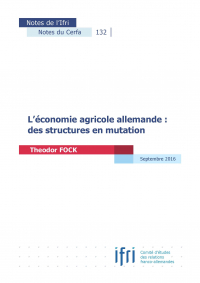Gateway to Think Tanks
| 来源类型 | Publications - Policy Papers - Notes du Cerfa |
| 规范类型 | 简报 |
| German agriculture: structural changes Notes du Cerfa, No. 132, September 2016 | |
| Theodor FOCK | |
| 发表日期 | 2016-09-13 |
| 出处 | Notes du Cerfa |
| 出版年 | 2016 |
| 概述 | German agriculture is characterized by regionally different farm structures but in the midst of a transformation process. Rapid structural change is seen especially in animal production. Total production increased during the past decade due to intensification but the number of labour force... |
| 摘要 |
German agriculture: structural changes Notes du Cerfa, No. 132, September 2016
German agriculture is characterized by regionally different farm structures but in the midst of a transformation process. Rapid structural change is seen especially in animal production. Total production increased during the past decade due to intensification but the number of labour force decreased. Increasing land prices are an indicator for the sectoral growth. The situation has changed at the moment. Farm income has decreased rapidly due to very low producer prices.  Discussion about agricultural policy fluctuates between two poles: approval of growth and competitiveness on one side and more protection of the environment and more animal welfare on the other side. In society especially the aspect of animal welfare has gained growing importance. Policy tries to consider this through voluntary measures of producers, food industry and food retailing companies. The scientific advisory board on agricultural policy at the German ministry of agriculture has published a study on pathways to socially accepted livestock husbandry in Germany which found broad attention. But problems could arise with international competitiveness. For aspects of environmental protection like biodiversity losses and nutrient contamination a similar controversial discussion is seen. Smouldering conflicts are found as well for the question of direct payments and the national implementation. Some parties seek to support small farmers more at the expense of big farmers. This is also a regional conflict due to big differences in farm sizes in different German regions. Up to now the German policy has normally chosen a medium course. Policy appears therefore a bit without a concept. The advantage is that there are more options for the future. Theodor Fock is professor of agricultural policy, political economy and environmental policy in Hoschchule Neubrandenburg in Mecklenburg-West Pomeraniums, in the agricultural department economics and sciences of food. This content is available in French and German.
|
| 关键词 | Agriculture agricultural economics Germany |
| URL | https://www.ifri.org/en/publications/notes-de-lifri/notes-cerfa/german-agriculture-structural-changes |
| 来源智库 | French Institute of International Relations (France) |
| 资源类型 | 智库出版物 |
| 条目标识符 | http://119.78.100.153/handle/2XGU8XDN/416210 |
| 推荐引用方式 GB/T 7714 | Theodor FOCK. German agriculture: structural changes Notes du Cerfa, No. 132, September 2016. 2016. |
| 条目包含的文件 | ||||||
| 文件名称/大小 | 资源类型 | 版本类型 | 开放类型 | 使用许可 | ||
| ndc_132_-_t._fock_-_(23KB) | 智库出版物 | 限制开放 | CC BY-NC-SA |  浏览 | ||
除非特别说明,本系统中所有内容都受版权保护,并保留所有权利。